Capacity Building for FAIR Data Sharing and Digital Preservation
Abstract
Session theme: 2. Archaeological Sciences, Humanities and the Digital era: Bridging the Gaps
Session organisers: Rose, Thomas (Forschungsbereich Archäometallurgie, Leibniz-Forschungsmuseum für Georessourcen/Deutsches Bergbau-Museum Bochum) – Richards, Julian (Archaeology Data Service, University of York) – Giaccari, Matteo (Department of Earth Sciences, Sapienza University of Rome) – Niccolucci, Franco (PIN, University of Florence) – Ercoles, Isabella (Department of Earth Sciences, Sapienza University of Rome)
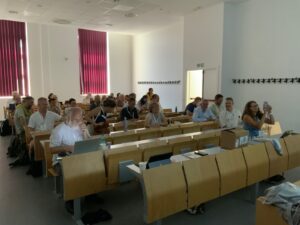
Session 381 audience EAA 2024
Session format: Discussion session (with formal abstracts)
More than other disciplines, archaeology relies on the proper collection, documentation and publication of data because of excavations being an inherently destructive methodology. Moreover, research progress relies strongly on sharing this data to allow for comparison and contextualisation of findings and processes. In the last decade, data sharing was boosted by the development of research infrastructures such as ARIADNE RI (Research Infrastructure), which now also provides the archaeological expertise in the EU-funded ATRIUM project. ATRIUM aims to consolidate and expand such services across the Arts and Humanities. Despite all these activities, the SEADDA COST Action identified a fragmented landscape. Many countries lack the capacity and expertise to create and manage data according to the FAIR principles (Finable, Accessible, Interoperable, Reusable), or to ensure their long-term preservation. Moreover, researchers may have already heard about such research infrastructures but often are held back in sharing data through them. A major obstacle seems to be the lack of standards and guidance but also intuitive tools to feed one’s own data into a research infrastructure. Consequently, data are still not as widely available and cannot flow as easily as would be desirable to boost archaeology. Our session brings together researchers and infrastructure providers, archaeologists and archaeological scientists. We invite contributions spanning users and providers which identify and discuss the issues and challenges we face when using datasets, sharing data and keeping them available in the long-term, from the peculiarities of single data sets over the huge diversity of data archaeologists handle, to the current volatility of funding for research infrastructures. In the discussion, we will aim to define some guidelines on how data sharing can be facilitated on the different levels and what actions are needed by individuals and institutions to let data flow with research infrastructures as their safe and permanent havens.
Abstract Book: 30th EAA Annual Meeting (Rome, Italy 2024) – Abstract Book Names, titles and affiliations are reproduced as submitted by the session organisers and/or authors. Language and wording of titles and abstracts were not revised. Technical editing: Sára Tylšová, Magda Karabáš (EAA) Design and layout: Sára Tylšová, Magda Karabáš (EAA) Design – cover: Symposia srl Design – logo: Caterina Amendola European Association of Archaeologists Rome, August 2024 © European Association of Archaeologists, 2024 ISBN 978-80-88441-08-3 30th EAA Annual Meeting (Rome, 2024)
Presentations
Introduction
Rose, Thomas (Forschungsbereich Archäometallurgie, Leibniz-Forschungsmuseum für Georessourcen/Deutsches Bergbau-Museum Bochum)
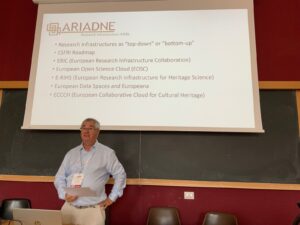
European data initiatives relevant to the ARIADNE RI
1. Research Infrastructures for Fair Data Sharing in the Heritage Sector.
Richards, Julian (University of York; ARIADNE RI) – Niccolucci, Franco (PIN; ARIADNE RI)
2. Capacity Building at National Level: Organisational and Technical Issues of Archaeological Data Infrastructure in The Czech Republic
Novak, David (Institute of Archaeology of the CAS, Prague)
3. Digital Archaeological Archiving in Poland – SEADDA Cost Action and Beyond
Oniszczuk, Agnieszka (Narodowy Instytut Dziedzictwa/National Institute of Cultural Heritage)
4. Is a Distributed Network of Support Staff the Way Forward? The SND Experience
Jakobsson, Ulf (Swedish National Data Service)
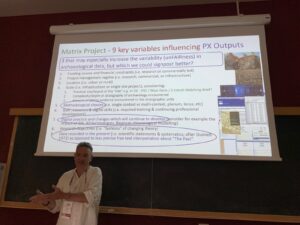
Keith May presents the Matrix Project
5. Archaeological Infrastructures in Norway
Uleberg, Espen – Pantos, George – Indgjerd, Hallvard (Museum of Cultural History, University of Oslo) – Callieri, Marco (Visual Computing LabISTI-CNR) – Dell’Unto, Nicolo (Museum of Cultural History, University of Oslo; Department of Archaeology and Ancient History, Lund University) – Bonelli, Letizia – Kimball, Justin – Kristensen, Steinar – Samdal, Magne – Aarseth, Bjarte (Museum of Cultural History, University of Oslo)
6. Re-Engineering Which Processes? To What Extent are Post-excavation Practices, Techniques and Documentation as Well Established as Methods for On-site Recording?
May, Keith (HE – Historic England; University of South Wales; University of Sheffield) – Taylor, James (University of York)
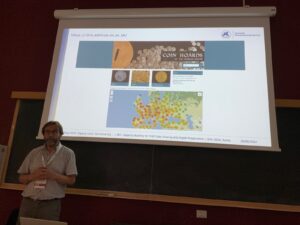
David Wigg-Wolf and Nomisma.org
7. Overcoming Barriers to Preserving And Disseminating Archaeological Data: The Case of PEPADB
Romero-Garcia, Galo (Universidad de Sevilla) – Sánchez-Gómez, Daniel (University of Lisbon) – Garrido-Cordero, José Ángel (Universidad de Sevilla) – Odriozola, Carlos P. (Universidad de Sevilla)
9. Digging Coins. Nomisma.Org, A Controlled Vocabulary and Ontology for Numismatic … and Archaeological? … Linked Open Data
Wigg-Wolf, David (Römisch-Germanische Kommission des Deutschen Archäologischen Instituts (RGK))
10. Recent Advances in Querying the Road Database to Make Data FAIR
Kandel, Andrew – Haidle, Miriam (Heidelberger Akademie der Wissenschaften) – Hochschild, Volker (Heidelberger Akademie der Wissenschaften; University of Tübingen) – Kanaeva, Zara (Heidelberger Akademie der Wissenschaften) – Conard, Nicholas (Heidelberger Akademie der Wissenschaften; University of Tübingen)
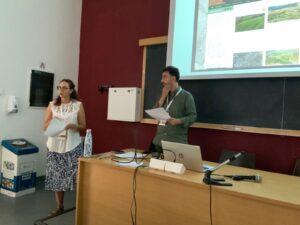
Sharing agrarian datasets in the PARCEDES Project
11. About Geohistorical Fair Data in the French Context of Research. The Case of the PARCEDES Project on Agrarian Landscapes
Odore, Angelo (Universitè de Rennes 2) – Watteaux, Magali (Universitè de Rennes 2) – Costa, Laurent (ArScAn –UMR 7041 « Mondes grecs archaïques et classiques »)
12. Radiocarbon Databases Towards Interoperability: The Case of Mexico and the ArqueoData Project
Alcántara Chávez, Luis Alberto (ArqueoData Project, Mexico; Museo del Templo Mayor, INAH, Mexico)
13. Keep Control of Your Data! A Decentralized, Open-Source and Community-Driven Approach to Archaeological Data Sharing Through the archeoViz Portal
Plutniak, Sébastien (CNRS (France); Laboratoire CITERES-LAT) – Vignoles, Anaïs (Université de Liège) – Caron-Laviolette, Élisa (Université Paris 1)
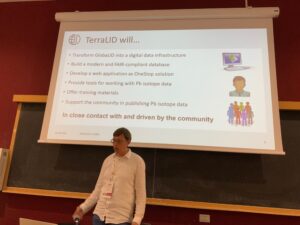
GlobaLID – FAIR lead isotope data initiative
14. GlobaLID: A New Community-Driven Research Data Infrastructure for Sharing Fair Lead Isotope Data
Rose, Thomas – Greifelt, Tim – Westner, Katrin – Hornschuch, Annette – Hsu, Yiu-Kang (Forschungsbereich Archäometallurgie, Leibniz-Forschungsmuseum für Georessourcen/Deutsches Bergbau- Museum Bochum, Bochum, Germany) – Wiethoff, Helge (Rechenzentrum, Technische Hochschule Georg Agricola, Bochum, Germany) – Klein, Sabine (Forschungsbereich Archäometallurgie, Leibniz-Forschungsmuseum für Georessourcen/Deutsches Bergbau-Museum Bochum, Bochum, Germany; Institut für Archäologische Wissenschaften, Ruhr-Universität Bochum, Bochum, Germany; FIERCE, Frankfurt Isotope & Element Research Centre,Goethe Universität Frankfurt, Frankfurt am Main, Germany)
15. CHRoMA: Towards Interoperability of Archaeological Survey Data by Addressing Colour Vision Deficiency in The Map Legend
McKeague, Peter (Historic Environment Scotland) – Crameri, Fabio (Undertone Design) – Binding, Ceri – Tudhope, Douglas (University of South Wales)
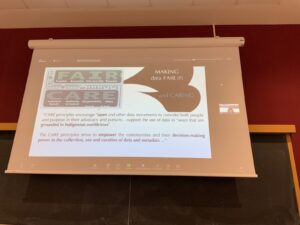
Using FAIR and CARE with human remains data
16. “As Open as Possible and as Closed As Necessary”? Uncomfortable Heritages and Data Sharing of Human(Remain)s.
Alves-Cardoso, Francisca (Centro em Rede de Investigação em Antropologia (CRIA); In2PAST – Associate Laboratory for Research and Innovation in Heritage, Arts, Sustainability and Territory)
This presentation discussed the issues concerning data curation pertaining to human remains and how this topic can be approached. In particular, ethic issues apply to all the data created, including metadata. A number of policies were discussed for managing and sharing the data including FAIR and CARE and an approach proposed that follows that used by biobanks for biomedical research. [Presentation slides not available]

